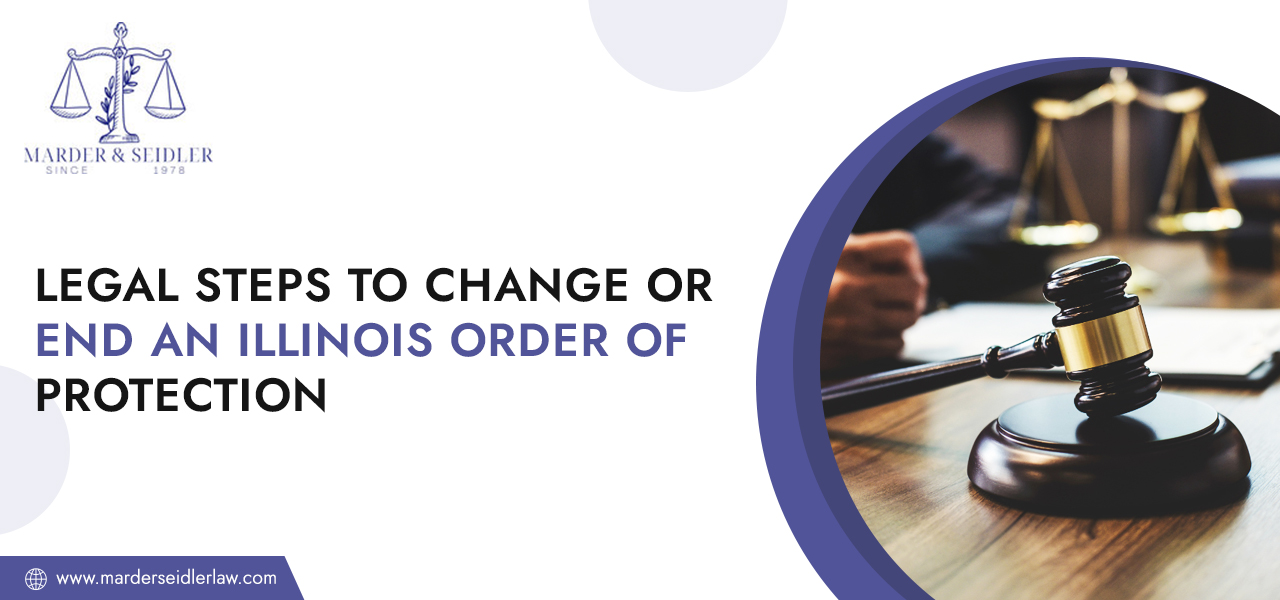Legal Steps to Change or End an Illinois Order of Protection

When emotions run high and relationships become strained, legal protections like an Order of Protection can serve as a vital safety net. However, circumstances often change. Maybe you and the other party have reconciled, or perhaps the terms of the order are no longer necessary or fair. In such situations, you might be wondering — is it possible to change or end an Illinois Order of Protection?
The answer is yes, but the process isn’t always simple. Whether you’re the petitioner (the person who requested the order) or the respondent (the person the order was issued against), understand the right legal steps with the help of the best Cook County attorney can make all the difference. Let’s walk through how this works, and why consulting domestic battery lawyers in Cook County can help guide you safely and confidently through the process.

When Can You Request a Change or Termination?
There are several legitimate reasons someone may wish to modify or end an Order of Protection in Illinois. For instance:
-
Changed circumstances
Maybe the parties have reconciled, moved apart, or the original danger no longer exists.
-
Unintended hardships
Sometimes the order’s terms prevent necessary communication — for example, when children are involved.
-
Errors or misunderstandings
Occasionally, the court order may have terms that were mistakenly included or misunderstood at the time of issuance.
In all these cases, the court needs to see a valid reason for making a change. You can’t simply decide on your own to ignore or violate the order — doing so can lead to serious legal consequences.
This is why reaching out to domestic battery lawyers in Cook County is strongly advised. They understand how local courts handle these requests and can help you present your situation effectively.
The Legal Steps to Modify or End an Illinois Order of Protection

Let’s break down the process step-by-step in plain terms.
1. File a Motion with the Court
To start, you’ll need to file a motion to modify or vacate the existing order with the same court that issued it. This motion formally requests the court to review the order and make specific changes or terminate it altogether.
Your motion must clearly explain:
- Why are you requesting the modification or termination?
- What circumstances have changed since the order was granted?
- What specific changes you want made?
This is where having a skilled attorney helps. A well-prepared motion can significantly improve your chances of success.
2. Notify the Other Party
After filing, the other party — whether that’s the petitioner or the respondent — must be notified of your request. They’ll have a chance to respond or object during a scheduled hearing. The court ensures both sides get the opportunity to present their case before making any changes.
3. Attend the Court Hearing
Next comes the court hearing, which is the most critical stage. Both parties can present evidence or testimony supporting their position.
The judge will consider:
- The safety and well-being of all parties involved.
- Whether the original reasons for the order still exist.
- Any evidence of reconciliation, compliance, or ongoing issues.
If the judge believes circumstances have truly changed — and that modifying or ending the order won’t put anyone in danger — they can issue a new order reflecting those changes.
4. Comply with the Court’s Decision
Once the court issues a ruling, make sure you understand and comply with the updated order. If the order is modified, review the new terms carefully. If it’s terminated, ensure all records reflect that decision — especially if the order restricted access to your home, children, or employment.
Your domestic battery attorney can help ensure every step is documented properly so you avoid any confusion later.
Why You Shouldn’t Try to Handle Illinois Order of Protection Alone?
Although filing a motion might sound simple, family and domestic-related cases are emotionally charged and legally complex. Even a small mistake in paperwork or wording can delay your case or cause it to be denied.
Working with Marder & Seidler’s experienced domestic battery lawyers in Cook County ensures that your rights are protected while maintaining sensitivity to the circumstances. These attorneys know how local judges interpret requests for modification and can help frame your arguments convincingly.
Our attorney will also ensure that your safety — and that of your family — remains the top priority. They’ll help you understand not just your legal rights, but also the potential emotional and social implications of modifying an order.
Important Things to Keep in Mind
- Do not contact the other party directly to “fix things” before the order is officially changed — that can be viewed as a violation.
- Keep all documentation related to the case — police reports, text messages, or proof of changed circumstances.
- Always attend all court dates and follow your lawyer’s instructions closely.
Final Thoughts
Life changes — and sometimes, so do the circumstances surrounding an Order of Protection. Illinois law allows individuals to request modifications or termination, but doing so requires a careful, legal approach through domestic battery lawyers in Cook County. Whether you seek more flexibility in communication or believe the order is no longer needed, you must follow proper legal channels.
Consult a trusted Attorney to ensure they handle your request professionally and respectfully. We are just a call away on 847-985-6767 to help you present your case with clarity, compassion, and the legal strength it deserves.
Because when it comes to protecting your rights — and your peace of mind — having the right attorney by your side makes all the difference.
